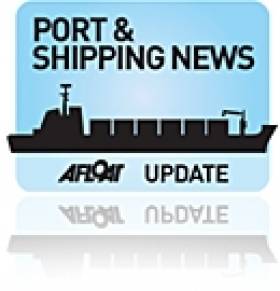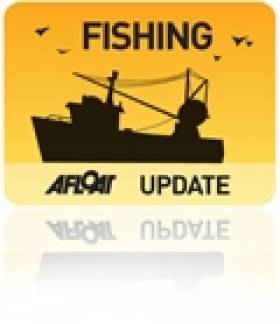Displaying items by tag: Our Ocean Wealth
#BlueEconomy - Marine Minister Simon Coveney launches the latest report on Ireland's Ocean Economy at the second annual Ocean Wealth Conference, taking place in Ringaskiddy, Cork today (Friday 10 July) as part of Ireland's national maritime festival SeaFest.
The report, compiled by NUI Galway's Socio-Economic Marine Research Unit (SEMRU) and Teagasc, estimates that the sector contributed an estimated €1.4bn to GDP last year.
As per Minister Coveney's address to the conference, Ireland's 'Blue Economy' is performing on average better than the general economy with up to 9% growth over the last five years.
With an estimated turnover of €4.5bn, the sector employs approximately 18,500 full-time equivalents and new data from shows that in addition to the direct impacts of Ireland's ocean economy, a further 13,000 are employed across the wider economy providing an additional €3.3bn in turnover.
This marks the third report on Ireland's Ocean Economy from NUI Galway's SEMRU as part of its ongoing process of collection and analysis of marine socio-economic data in Ireland funded by the Marine Institute.
Results from the report show trends in Ireland's Ocean Economy over the period 2010-2012 and provides an estimate of the direct value in 2014.
Speaking ahead of the conference, Minister Coveney said: "Over the past few years we've seen a dramatic and in some cases radical transformation in Ireland's attitude towards the marine sector generally, with the marine now being viewed as a significant contributor to our economic recovery.
"This new data from SEMRU and Teagasc shows that Ireland's blue economy is performing well in established industries such as seafood, shipping and marine tourism, and is excelling in emerging industries such as high-tech marine products and services, marine biotechnology and maritime commerce."
Summary of direct economic impacts:
• The ocean economy had a turnover of €4.2 billion in 2012, rising to an estimated €4.5bn in 2014.
• The ocean economy provided employment for 17,425 individuals Full Time Equivalents (FTEs) in 2012, with an estimated increase to 18,480 in 2014.
• Over the period 2010-2012 a 33% increase in turnover is reported, a further increase of 7% is estimated for the period up to 2014. Employment has also steadily risen, with increase of 5-6%.
• Top three marine sectors in terms of employment (FTEs): Marine Tourism & Leisure (6,000 FTEs); Seafood & Bioresources: Fisheries, Aquaculture, Seafood Processing, Biotech/Seaweed (over 5,600 FTEs); Shipping & Maritime Transport including international shipping services (over 4,100 FTEs)
• Top three marine sectors in terms of Turnover and Gross Value Added (GVA): Shipping & Maritime Transport including international shipping services (€2.2bn turnover, €0.5bn GVA); Seafood (€1bn turnover, €0.4bn GVA); Marine Tourism & Leisure (€0.7bn turnover, €0.3bn GVA)
• Established marine industries represent 95% of the total turnover and 93% of total employment in Ireland's ocean economy. Marine retail services, sea fisheries and seafood processing, all experienced a significant increase in activity, with turnover, GVA and employment increasing across the sector in the period. The aquaculture sector also exhibited increases, albeit of a smaller scale, across all three variables.
• Emerging marine industries representing 5% of the turnover and 7% of employment in Ireland's ocean economy. In comparison to the established industries, the emerging industries are excelling in terms of growth. High tech marine products and services, marine biotechnology and bio-products and marine commerce experienced large increases in turnover, GVA and employment. Marine renewable energy experienced a more moderate increase in turnover but a large increase in GVA. In terms of employment, however, the marine renewables sector experienced a slight decrease with respect to 2010 levels.
• The previous Ocean Economy Report published in 2013 referred to the lowest point of the economic contraction (2007-2010), while this report represents a period of slow economic recovery (2010-2012), with a moderate increase in activity, particularly in the shipping and maritime transport sector and in sea fisheries, seafood processing and marine manufacturing, construction and engineering. Estimates based on recent economic indicators suggest a further increase in activity across established and emerging marine industries in the 2012-2014 period. Combined with the confident national economic forecasts recently released by the Department of Finance, the trends shown in this third SEMRU report suggest a positive outlook for Ireland's ocean economy in 2015.
• SEMRU also produced estimates of Ireland's Ocean Economy for the year 2014. It is estimated to be worth €1.4bn, 0.8% GDP. With an estimated direct turnover of approx. €4.5bn, Ireland's ocean economy employs in excess of 18,400 full-time equivalents.
• Latest figures also suggest that our 'blue economy' is performing on average better than the general economy
"Results are encouraging," reports Dr Stephen Hynes of SEMRU at NUI Galway. "They reflect the economic recovery that Ireland has experienced in the last few years. With the recognition of the potential impact of 'Blue Growth' on employment and output, at both a national and EU level, there has never been a greater need for reliable statistics on marine sector activity.
"Also, it is only by examining the ocean-dependent economy separately from the national economy that we will be able to understand the magnitude of what might be affected by future changes in the oceans and along our coasts."
SEMRU, in conjunction with the Teagasc Rural Economy Development Programme, have also developed the Bio-Economy Input-Output (IO) Model, which studies the relationship between Ireland's marine-based and agriculture sectors and the rest of the economy and can be used to estimate both the direct and indirect effects on output and employment arising from increases or decreases in the output of individual marine sectors.
New data arising from the model shows that in addition to the people directly employed in Ireland's marine industries, a further 13,000 are employed indirectly across the wider economy providing an additional €3.3bn in turnover to the Irish economy.
The results of the model suggest that for every €100 in turnover from Ireland's Ocean Economy, a further €78 is generated indirectly in other sectors of the economy and for every 100 marine jobs created, a further 75 jobs are created in other parts of the economy.
The ocean economy report series and associated Input-Output model allows SEMRU to observe and monitor progress on meeting the targets set out in the Government's Integrated Marine Plan for Ireland - Harnessing Our Ocean Wealth (2012). The strategy outlines a number of specific targets which seek to expand the Irish marine sector to a total of €6.4bn in 2020, representing an increase of €3.2bn on 2010.
It is estimated that the achievement of these targets will also have additional 'knock-on' economic impacts with additional growth of €2.7bn anticipated in the wider economy.
Based on the results of running this scenario through the Bio-Economy IO model, it is estimated that 29,300 new jobs could be created if the Ocean Wealth targets are achieved with 16,100 of these coming directly from within the marine sector itself. An additional 13,200 jobs are estimated to be created indirectly through increases in demand for products and services required by the marine sector.
Prof Cathal O'Donoghue of Teagasc added that with the collection of marine socio-economic data "we are finally able to assess the direct and indirect impacts of national strategies such as Harnessing Our Ocean Wealth and Food Wise 2025 and their impact on employment and output in both the wider economy and in upstream and downstream industries.
"The impact of Ireland's ocean economy is particularly notable in Ireland's rural economy, as highlighted in the report of the Commission for the Economic Development of Rural Areas (CEDRA)".
Ireland's Ocean Economy Report Series is funded as part of the Marine Institute's Beaufort Marine Research Award. The Marine Institute provided funding over a seven-year period to establish marine socio-economic expertise in Ireland and develop a methodology of valuing Ireland's well established and emerging ocean industries.
The full report is available to download online at www.nuigalway.ie/semru/publications.html and www.ouroceanwealth.ie
Harnessing Our Ocean Wealth Conference 2015 - Save The Date
#OurOceanWealth - Ringaskiddy and Haulbowline in Cork Harbour will host the 2015 Harnessing Our Ocean Wealth Conference on 10 and 11 July.
Last June's inaugural event at Dublin Castle outlined the significant progress made to date in implementing the Government's 2012 Harnessing Our Ocean Wealth: An Integrated Marine Plan for Ireland.
This year the conference will be bolstered by events for investors and industry partners such as workshops and a trade fair, while the public will also be welcomed to the associated seafood festival and family fun activities.
More details will be announced as they become available at OurOceanWealth.ie.
#Ports&ShippingReview: Over the last fortnight, Jehan Ashmore has reported on the shipping scene, where at the inaugural 'Our Ocean Wealth' Conference, Simon Coveney, Minister for the Marine outlined significant progress made implementing the Government's 2012 Harnessing Our Ocean Wealth: An Integrated Marine Plan for Ireland.
Arklow Beach is the third of six 'B' class 'green' newbuilds launched in the Netherlands for Arklow Shipping's Dutch subsidiary.
LD Lines finally resume their Ireland-Spain service via western France served by ro-pax Norman Atlantic, following an absence of more than three months.
Only days after L.E. Samuel Beckett's first patrol and major exercise, the vessel she directly replaced the Emer arrived off the Nigerian capital of Lagos to begin a new career in the oil industry.
Customs officers at Drogheda Port seize a ship loaded with €14m of cigarettes and tobacco, the biggest haul in Europe so far this year. The vessel, Shingle was later escorted by Revenue Customs Cutters RCC Suirbheir and RCC Faire to Dublin Port where the contraband cargo was unloaded.
Port Statistics for 2013 from the Central Statistics Office (CSO) reveal that Irish Ports handled more traffic when compared to 2012 where vessels numbers increased by 1.1% to 11,940.
First 'Our Ocean Wealth' Conference Set For Next Month
#OurOceanWealth - The Marine Co-ordination Group at the Department of Agriculture, Food and the Marine has announced the first annual Our Ocean Wealth Conference taking place next month.
The conference will be held at The Printworks in Dublin Castle on Wednesday 18 June and will focus on the promotion of growth and jobs, providing a forum for the State - in association with the marine community - to review the progress in implementing Harnessing Our Ocean Wealth: An Integrated Marine Plan for Ireland.
For further information and registration visit the Our Ocean Wealth website at www.ouroceanwealth.ie.
#FISHING - Bord Iascaigh Mhara (BIM) recently convened a Fisheries Local Action Group (FLAG) with representatuves from the fishing and tourism industries, community groups and county councils to discuss ways to boost revenue in the Galway and Clare region.
As the Galway Advertiser reports, the Western region FLAG comes after the official launch of the 'Axis 4' programme for sustainable development of fishery-dependent areas, which aims to empower communities that rely on fishing or aquaculture to further develop the marine resources at their disposal.
It also comes hot on the heels of the Government's 'ocean wealth roadmap' launched by Marine Minister Simon Coveney earlier this month, which is specifically geared towards exploiting Ireland's potential for 'blue growth'.
The six FLAGs established in key coastal areas around Ireland are responsible for formulating a development strategy for funding suitable local projects. To qualify for funding support, such projects must satisfy a list of critera, such as having a clear marine connection or providing specific benefit to a fishing area.
The Galway Advertiser has much more on the story HERE.
#OUR OCEAN WEALTH - The Irish Marine Federation's (IMF) submission to the Government's consultation process on harnessing the potential of Ireland's vast marine resources has been published online.
In the submission, the trade federation representing all aspects of the marine industry outlines its position for Our Ocean Wealth, the outline for an integrated Marine Plan for Ireland launched by Minister for the Marine Simon Coveney earlier this year.
Regarding the potential for marine leisure tourism, the IMF emphasises Ireland's strengths in cruising, sailing and angling, plus diving, surfing and other extreme sports, as well as the "potential for developing new products around eco tourism".
According to the report: "The sea and our coastline should be treated as if it were a public park with free access to the public with proper facilities in place to ensure sustainability."
Further to this involves the provision of "more egalitarian access to the sea and to safe harbours or marina berthing availability".
A number of "impediments to development" are also highlighted in the submission, ranging from the need for reform of the Foreshore Act to the inconsistent approach of local authorities to the development of Ireland's coastal resources.
The IMF submission is available as a PDF to read or download HERE.
Minister Launches Consultation on Harnessing Ireland's Ocean Wealth
#NEWS UPDATE - Minister for the Marine Simon Coveney has launched a public consultation process on harnessing the potential of Ireland's vast marine resources.
Our Ocean Wealth is calling for input into how Ireland can best capitalise on the trillion-euro global market for marine products and services, from seafood and tourism to shipping, oil and gas, renewable ocean energy and marine science.
Launching the consultation, Minister Coveney said: "We need to change the way we in Ireland think about the sea and look for new opportunities to harness the potential of our 220-million-acre marine resource.
"This government is determined to generate the momentum to drive forward a new era of sustainable economic development across the maritime sectors - we must avail of these opportunities to assist in our recovery. We want your help to shape our plan, to shape our future and to assist in our drive towards our nation's economic recovery."
The consultation process is a step towards developing an Integrated Marine Plan for Ireland intended to grow the percentage of GDP generated by the country's marine resource, which covers an area 10 times the size of Ireland's land mass.
The minister added: "We need an Integrated Marine Plan to harness our ocean wealth, get the environment right for investment and use the potential of our marine economy to create jobs in a sustainable manner."
The consultation phase will be open until 31 March with an aim to publish the Integrated Marine Plan during the summer. For more details visit www.ouroceanwealth.ie.


























